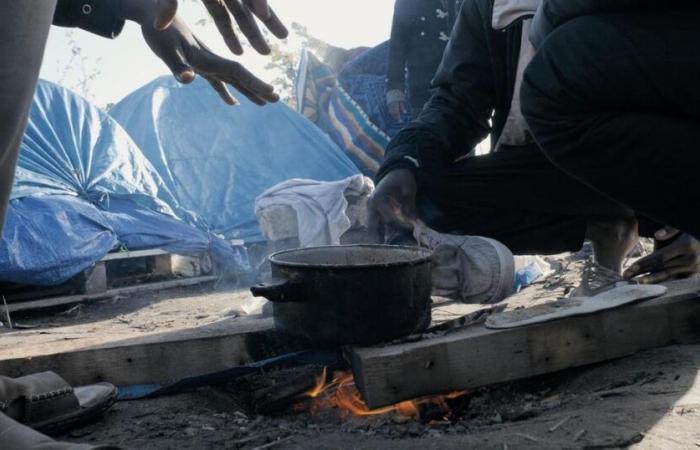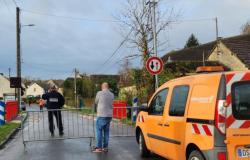Since the start of the year, 26,000 migrants have arrived in England via the Channel and 54 people have died during the crossing. But who are those who attempt the journey? RTS went to meet them on both sides of this sea which mixes drama and hope.
In the wastelands of Calais, in the north of France, people wait, hidden in the embankments or nestled in the tall grass. Men, women and children sleep in makeshift tents, in sometimes freezing weather, with only one hope: to reach the United Kingdom for a better life.
A Georgian family, installed in a wasteland next to the Calais motorway, shelters under a tarpaulin stretched between two small tents. Three generations gather around a fire which burns painfully. Why do they want to join England? “To go to school there,” replies the 9-year-old cadet, interviewed Tuesday in La Matinale. They have been waiting for a year to attempt the crossing. These twelve months spent outside were enough for the children to learn a little French and they are the ones who converse with the humanitarian workers.
“Do you need wood?” asks a volunteer holding a wheelbarrow full of logs. “Yes, here,” says the child. In these precarious living conditions, fire is an essential element. It allows you to warm up, cook and dry your clothes. So to guarantee some of this, the Woodyard team prepares and distributes bags of wood daily to migrant people living outside.
Hope at the end of the sea
The initiative, headed by Migrants' Hostelhas existed since 2016 and it does not receive any public funding. “It’s very violent that people are outside all the time, including when it’s cold and raining a lot,” regrets Romane, Woodyard coordinator, who is leading today’s distribution. She takes the route again, this time in the direction of three young men.
“I come from Eritrea, I arrived in Calais yesterday,” says one of them, sheltering as best he can under his raincoat. He passed through Libya, Italy and applied for asylum in France, a request which was refused. He continues his journey, with the hope of being welcomed in the United Kingdom. “No”, he is not afraid of crossing the Channel on a makeshift boat, he assures.
Before confiding, with a trembling voice: “I left my country in 2015. So it’s been nine years, almost ten. It’s my life…” Despite these years on the road, he hopes to resume studies once in the Kingdom -United.
On the other side
After four months in Calais and a failed crossing attempt, Ali* finally managed to reach England via the English Channel, aboard a “small boat” (“small boat”, in English). Originally from Somalia, he passed through Spain and France, before reaching England. “We used the boat to come here, to be safe,” he explains. “It’s not pleasant, but it’s the journey.”
The crossing is dangerous, particularly because it is carried out on board saturated inflatable boats. Since January, 54 people have died attempting the crossing. A number that makes 2024 a particularly deadly year.
Housed in a military barracks
Ali* is currently housed in “Napier Barracks”, a former military barracks transformed into a center for asylum seekers and based in Folkestone, a coastal town in the south of the United Kingdom. The location is controversial because the building, deemed non-compliant, had to be destroyed. Its use was finally extended until 2025.
>> The report from Tout un monde with the migrants who managed to cross to the United Kingdom:
About 300 people are housed there, explains Sally Hough, manager of the “Drop in Centre”a reception center for asylum seekers residing at Napier Barracks. Located in a peaked roof cottage adjacent to Folkestone Church, the center is open every Wednesday. We give administrative advice, we exchange ideas, we cook and we exchange ideas. Among those who stop there, we find Ali.
The myth of the boat
“More than 50% of the people housed at Napier Barracks arrived by plane and less than 50% by boat. It is a myth to think that they all came by boat. (…) After their arrival in Dover, these people disperse across the country, it is only once they are registered in the asylum system that they can be accommodated here,” underlines Sally Hough.
This is the case for Ali. After arriving on English shores, he headed straight to London. It was only once his asylum application was registered that the authorities placed him in this accommodation, at the gates of the Channel. He often looks at this sea before his eyes. “It reminds me of the day of the trip. Sometimes we go there just to look at it. I always remember what happened. I remember and will never forget.”
Ali has already had his first asylum interview, he is waiting for the second, with the hope of bringing his wife and parents.
*assumed first name
Salome Laurent






